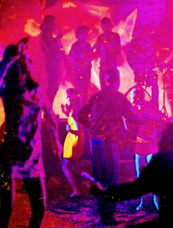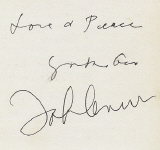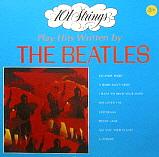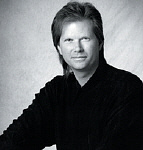101 Strings: Yesterday and Today

by Barry Stoller
(September 2006)
Towards the end of 1995, the tidal wave buzz of a 'Beatles reunion' reached my consciousness, a headset that hadn't considered the Fabs for many a year. Not that I was immune to the 'Twentieth Century's greatest romance' (as Derek Taylor aptly phrased it) by any means. My fate was sealed in 1972 when, at the age of 12, I mailed John & Yoko a fan letter - and, utterly stunned, received their autograph in return. I had given my love as freely as anyone in those youthful madcap years. Nevertheless I inadvertently found myself in the thick of adulthood one day, as everyone does.I had the misfortune to first hear "Free As A Bird" from the perforated ceiling speaker of a grocery store. Hearing it and not hearing it, I sighed as only a middle-aged man with a shopping cart full of responsibilities would - with the dire perception of a million daydreams fluttering to earth like a tempest of dried leaves. Standing in the center of that majestic whirlwind of nostalgic sound, so many chimerical associations and images, stood the dead John Lennon, his strange asomatous voice transmitting data from the other side of the crystal ball... before being interrupted by a price check in aisle three. Dammit!

If anything were less likely than a 'Beatles reunion,' it would be a 'new album' by the easy listening outfit that, against unremitting galaxies of competitors, produced the single best Beatles 'tribute' album of the 1960's - 101 Strings. After all, all principle participants - arrangers, producers, musicians, label owners - were deceased. As fate and the free market would have it, the final 101 Strings commodity was their Beatles set repackaged as a 'tribute' to the recently slain Lennon, in early '81.
Yet, in the mid-90's (as the Threetles embarked upon the Anthology project), the moribund 101 Strings catalog was sold by the estate of Alshire Records to the obscure, upcoming Madacy label. Taking stock of the post-techno 'lounge revival,' Madacy decided to freshen up the oft-recycled old comps and commissioned some all-new recordings by 'The New 101 Strings.' Since the Fabs were again hitting the charts, a Beatles 'tribute' proved to be a perfect move for the resuscitated masters of easy listening.
Easy listening?
Who doesn't need a little 'mood music' (behavior modification) in today's obstreperous, shock-value culture? Devo neo-started the trend in 1987 with E-Z Listening Disc, elevatorizing their own repertoire. The Balanescu Quartet raised the bar when they covered "Autobahn" and other Kraftwerk classics. Since then, the Nutley Brass set the Ramones' greatest hits to vintage easy arrangements while Todd Mark Rubenstein built a 185-album empire specializing in 'string quartet tributes' to mainstream acts ranging from Mariah Carey to Metallica. Forget Pink Floyd's "Echoes"; the originals stoners were spacing out to Martin Denny's "Quiet Village," which seemed so far removed from their time that it might as well have been before electricity was even invented.
What accommodates an iPod throughout everyday situations better than translucent and tranquil instrumentals? Most pop lyrics are trash, and the few intelligent ones compete too much with necessary thinking and conversing. Turn off your mind, relax and float downstream... to 101 Strings' "Stars Over Maui" or "Blue Twilight," in-house originals intended as publishing filler but, freed of the imperatives of crass hit-making, represent a resplendent and oblique pop underworld.
Much of 101 Strings' output preserves a parallel 1960's, a forgotten culture, the entertainment ideology of those who won the world war, then lost the generation gap. The frequently recycled tracks suggest an indiscriminate audience but, unlike the young boomers, these were listeners of music (pure and simple), not purchasers of pop idols (bigger than Christ or otherwise). Eventually, their music was vanquished and deteriorated into a 'now sound' simulacra of rock & roll, creating dialectical mashups like the Living Strings' implausible Alice's Restaurant or, better yet, 101 Strings' acid-rock Astro-Sounds from Beyond the Year 2000.
As the crumbling show biz infrastructure railed against the long-haired interlopers (in language less elegant than that of Ozymandias), its survival necessitated campaigns of cooptation. The Beatle wigs derisively placed upon the heads of Milton Berle and Bob Hope soon yielded to Ella Fitzgerald and Bobby Darin belting out Fab fare. Competing with George Martin's own orchestral versions, Capitol Records issued a series of easy listening Beatle albums (by the Hollyridge Strings) as early as 1964.
Despite their reputation as ambassadors of the eccentric, the Beatles trafficked in pure pop. Without the witty lyrics and zany sound effects, Beatle songs made serendipitous, even heavenly, lounge music. Never one to miss a trend, 101 Strings rushed out some swinging Beatlemania drawn from the Martin template before permitting house arranger Monty Kelly (architect of the perversely groovy Sounds of Today LP) complete creative freedom on a souped-up post-Pepper set. The resulting album, 1968's Hits Written by The Beatles, offers an unparalleled zenith in easy listening Fabdom.

"Penny Lane" is a Renaissance explosion of styles - baroque, grandioso, comic and tragic, Kelly keeps his time tripper moving around the May Pole with pizzicato strings, quadrille snares, merrymaking flute and capricious whiffs of brass. "Yesterday" is given the anamorphic treatment with church organ, cowboy guitar, arpeggio cello and pastoral trombone. "All You Need Is Love," with its flaming William Tell Overture intro, trots out Edwardian piano and Guy Lombardo glissandos with champagne audacity.
Plus, there are three Kelly compositions composed 'in the style of' the Beatles. "Six Pence And You" is Carnaby Street A Go-Go with its 'whistling' flute, natty brass and dashing tympani, while "Tropic of Chelsea" offers a Jetsons conception of the token Ringo song. Best of all, "Blues For The Guru" is a day-glo jam session -- Vox Continential filigrees, harmonica moans, Stax sax, Vegas strings, whapping bass, shotgun drums and twangin' Danelectro sitar. It's outtasight.
Fast forward 38 years...
The Beatles Volume One and Two, arranged (primarily) by Greg Sims (Orlando Philharmonic Orchestra), introduces a distinctly 'new' 101 Strings. This is not 'The Doors Of The 21st Century' or the 'New Cars' - it honors the original by staying clear of mimicry's easy nostalgia. There are no sitar blues or harpsichord excursions, no pizzicato runs or atomic-powered glissandos, no pseudo-Fab originals and, above all, no brazen delusion that time froze with William Shatner's smile in 1968.

To his credit, Sims puts the 101 Strings squarely in the 21st Century and endows the sound an original character - pure orchestral power, possibly 101 strings - a musing colossus. With hardly a trace left of yesterday's amplified 'now sound' imperatives, the new 101 Strings plays the elongated pop of the concert hall. Other than supercharged bass and a couple of switched-on cameos (electric guitar on "Nowhere Man" and ARP synthesizer on "Come Together"), organic sound prevails. There are drums - and, like the violins, they have been recorded with titanic drama, an enormous rush of muscle. And passion. When the beat kicks in on "Hello Goodbye," the acoustic force is strong enough to crash a hard drive or empty out (all too human) tear ducts.
The sound here is preternatural, not the music of the celebrities, but the kinetoscopic flashes of the sound as remembered -- intangible, fantastic, primitive, personal. Like a dream, the arrangements of these deeply embedded melodies shift and refract, dissolving and regenerating like undulating Visualizer patterns (there are few recordings better suited for today's lava lamp). Like the Magic Eye patterns of the '90's, The Beatles Volume One and Two is superficial 'filler'; like the terrifying truth under the sanitized cover of Yesterday And Today, the nova core awaits the diligent.
To his credit, Sims approaches "Penny Lane," stamped so brilliantly by Kelly a generation ago, with complete self-possession of originality. It is introduced by orchestral flourishes that conceal entirely, and entertainingly, the composition to come. Considering the travails this overplayed standard has experienced, nothing less than protean bravado on the part of the arranger will do. Sims, for the most part, is up to the task, dashing syncopations throughout the melody line. Although "She's Leaving Home" - one of the most sympathetic portrayals of the generation gap, ever - too literally follows the Sgt. Pepper arrangement, Sims indulges in some intrepid harmony extrapolations on "In My Life," cleverly integrating his own riffs within the molecular structure of Lennon's melody (wisely avoiding any hint of 'Elizabethan' piano).
Speaking to Sims about the project, he told me, "I knew of 101 Strings mostly by reputation only - and hearing some cuts here and there from some of my parents musical friends. I've loved symphonic music as long as I remember."
Volume One is the more expansive of the series. There are fancy ideas everywhere - the bubbling vamp propelling "Nowhere Man," the 'Pepperland' fugue inside "Sgt. Pepper's Lonely Hearts Club Band" and infinite tangents proliferating throughout "All My Loving." Sims gives of himself to make the listening experience surprising (a key Beatle element).
The standout track is "Michelle," richly ornamented with Paganini-styled solos and a high-stepping verse of 6/8. Sims recalls, "My first recollection of the Beatles was on the radio hearing 'Michelle.' I was just a kid, but I was really into classical music and piano (I started lessons when I was five). I was struck by the haunting melody - and probably by hearing French for the first time."
When I asked Greg Sims if there were any other Beatle tunes he wished he could have included in his set, he specified "While My Guitar Gently Weeps."
Acknowledging the time irretrievably vaporized since the Sixties, Sims' arrangements are thoroughly electromagnetized with contemplative reverie. Simply put, (the new) 101 Strings takes a sad song and makes it sadder.
"Free As A Bird," one of the most specific songs ever recorded, is the most daring selection. Ungodly devastating, it does justice to the legacy of 101 Strings. Sims' score rolls like subconscious cirrus from forbidden vistas locked in the past -- school playgrounds, hippie basements, marriage rites... the night Lennon was killed, the night Ed Sullivan introduced the 'Four lads'... so quiet and calm, a newsreel of déjà vu... a post-hypnotic suggestion triggered by and synchronized with funnels of cellos, eddies of violas, escalating violins and one disembodied cornet...
The music of my childhood was my parent's -- classical and opera. They were pop snobs. When I was six years old, sitting next to my father as he drove through downtown Cincinnati during the summer 1966. The air exploded with a thousand screams, a communal roar of excited delight, a commotion utterly implausible and I asked my father, 'What is that?' 'It's the Beetles,' he replied with an edge of derision. There was no music in the din, just a megawatt mass orgasm in Spectrasound. I understood Spider-Man and the Outer Limits, but the sound coming out of Crosley Field that afternoon was pretty confusing, I concluded. Nevertheless, there I was a few weeks later, bringing my crewcut into the local barber shop and requesting a 'Beetle haircut.'
The generation gap has long been effaced and, today, grocery stores do not play easy listening music. They play Beatles (U2, Sting, even the Ramones), the new 'elevator music.' I'll not be hearing the 101 Strings' rendition of "Free As A Bird" in the produce department, it will only be heard at home (unless I bring my iPod shopping). And, considering how ineffably it plays (in my head), that's fine by me.
Barry Stoller is presently compiling a discography of 101 Strings. He has written biographies of Terry Knight and Bloodrock, and contributes regularly to Perfect Sound Forever.